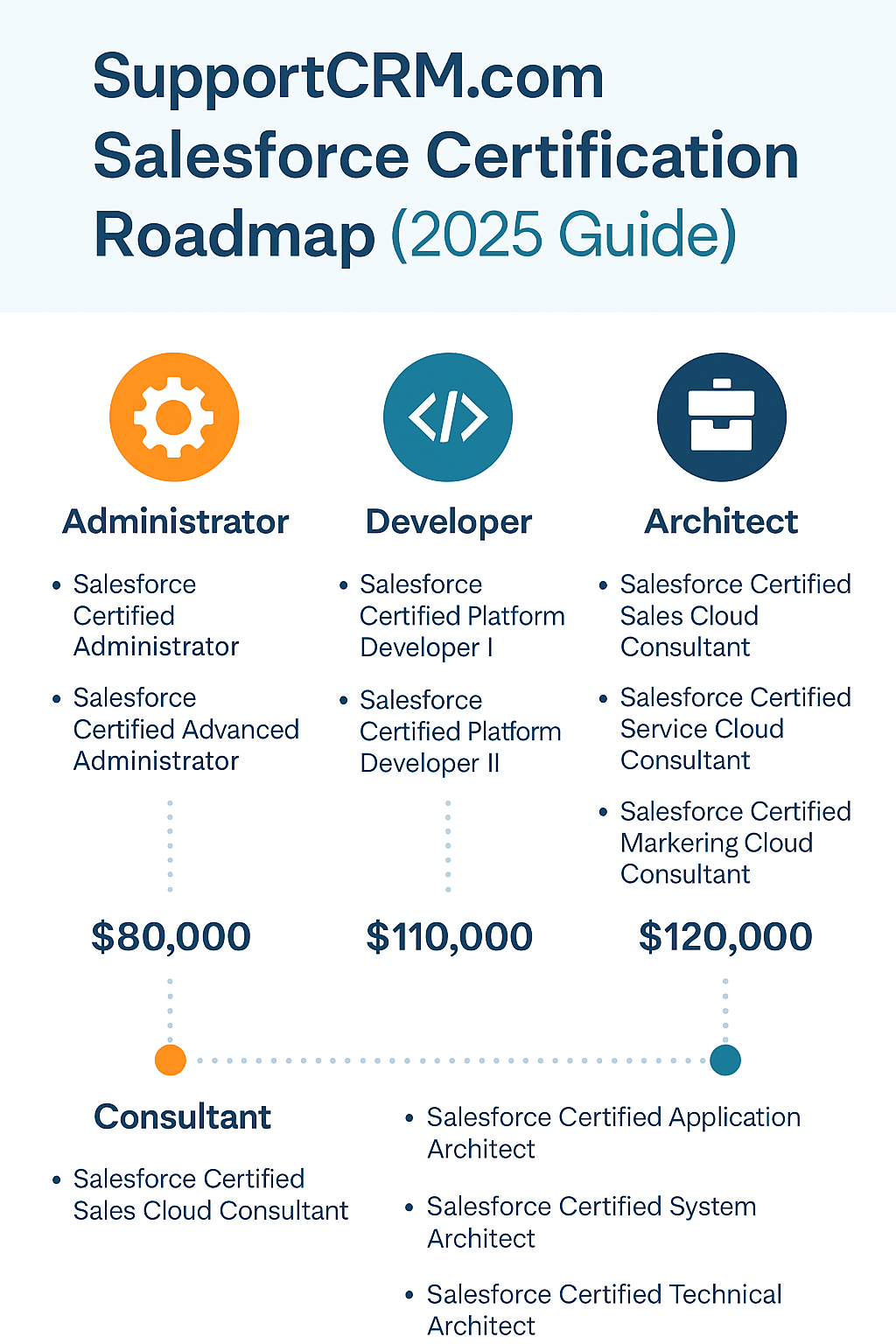Salesforce Certification Roadmap
Introduction
In 2025, the world of CRM is highly competitive. Employers demand certified skills in platforms like Salesforce, Microsoft Dynamics 365, Oracle CX, and others. With so many certification paths, prices, and time investments, many professionals wonder: “Do CRM certifications deliver enough return on investment (ROI) to justify their cost?”
Typical CRM Certification Costs
Certification costs vary by vendor, level, and region. Below is a representative breakdown to help you budget and compare:
| Vendor / Certification | Level | Estimated Cost (USD) | Notes |
|---|---|---|---|
| Salesforce | Administrator / Associate | $200 - $300 | Typical exam fee; study materials extra |
| Salesforce | Platform Developer / Consultant | $200 - $400 | Advanced exams and specialty certs cost more |
| Microsoft Dynamics 365 | Functional Consultant / Developer | $165 - $330 | Pricing can depend on country and exam bundles |
| Oracle CX | Specialist / Professional | $150 - $400 | Vendor training often charged separately |
| Third-party / Niche CRM | Various | $50 - $500 | Varies widely by provider and delivery method |

Hidden & Ongoing Costs
- Official training courses and bootcamps
- Study materials, practice exams, and labs
- Time invested (opportunity cost of working hours)
- Recertification or continuing education fees
- Travel costs for in-person exams or trainings
Measuring ROI
ROI from CRM certifications is both quantitative and qualitative. To calculate a basic quantitative ROI:
- Estimate the total cost (exam + training + time).
- Estimate the benefit: salary increase, promotion, job conversion, or higher billable rates.
- ROI (%) = (Net Benefit / Total Cost) × 100
Example: If total cost = $1,500 and annual salary uplift or new contract value = $6,000, Net Benefit = $4,500 → ROI = 300%.
Qualitative Benefits
- Improved credibility with employers and clients
- Faster hiring and shorter interview cycles
- Access to vendor communities, partner programs, and exclusive resources
- Better practical skills, structured learning path, and validated knowledge
- Potential for higher bill rates as a contractor or consultant
When Certifications Make the Most Sense
Consider pursuing certification when any of the following apply:
- You are early in your CRM career and want to stand out.
- Your target employer lists certifications as a preferred or required qualification.
- You're transitioning into a new CRM platform and need structured learning.
- You are building a consultant/partner profile where vendor credentials unlock business leads.
When to Reconsider
Certification might be lower priority if:
- You already have strong hands-on experience and demonstrable project outcomes that employers value more than certificates.
- The specific certification is outdated or rarely used in your target market.
- The total cost (money + time) outweighs likely near-term benefits.
How to Maximize Your Certification ROI
- Choose certifications aligned with in-demand skills and regional employer needs.
- Combine self-study with targeted hands-on projects to show real results on your resume/portfolio.
- Leverage vendor partner programs to access discounts, labs, and community support.
- Use certifications as a signal while highlighting measurable achievements (KPIs, deployment results).
Conclusion
CRM certifications can deliver strong ROI when chosen and used strategically. They are especially valuable for early-career professionals, those switching platforms, and consultants seeking credibility. Always account for both direct fees and hidden costs, and measure ROI against realistic salary/contract uplift and career goals.
If you're considering a certification, map the expected costs against tangible outcomes (interviews, promotions, higher rates) and choose the path that best serves your career plan.